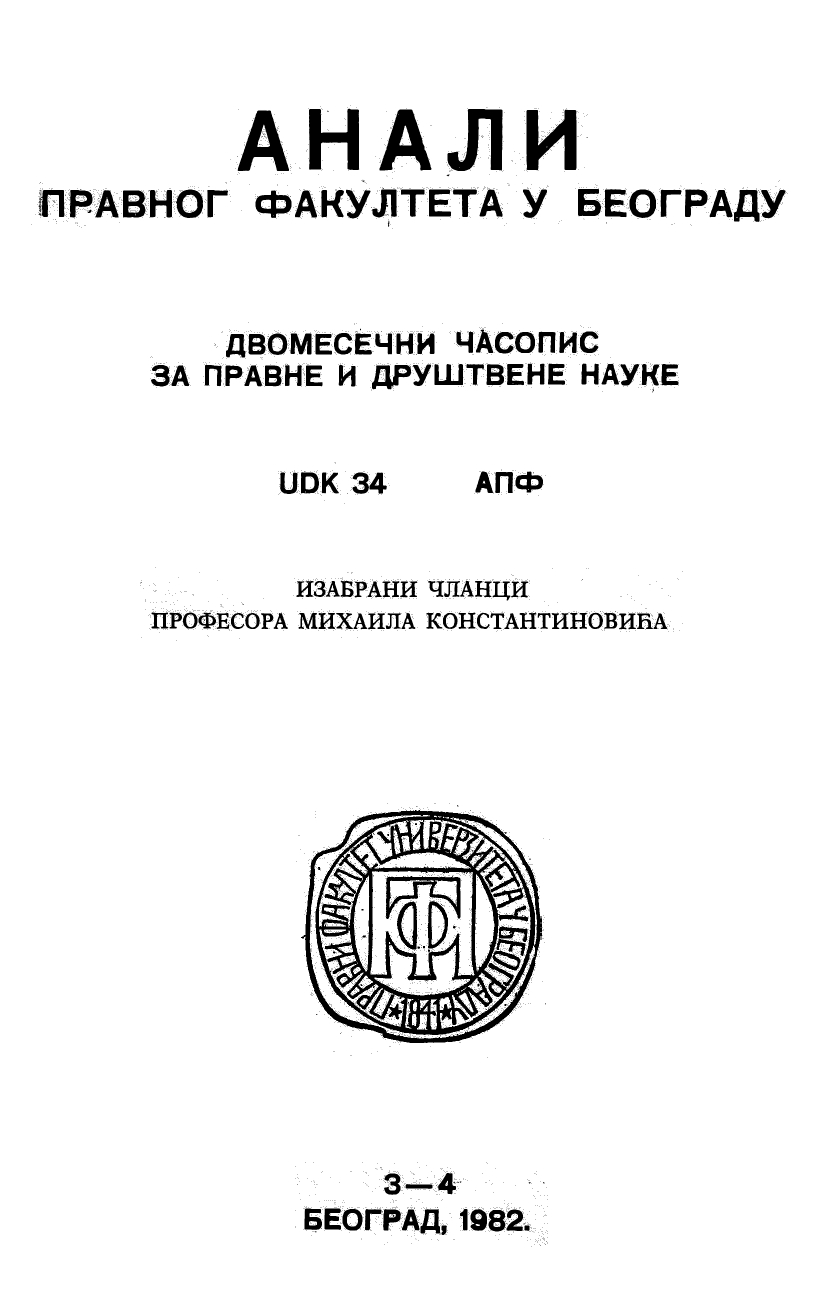КЊИЖЕВНИ И УМЕТНИЧКИ РАД И ПРАВО (Ауторско право)
LITERARY AND ARTISTIC WORK AND RIGHTS
Author(s): Mihailo KonstantinovićSubject(s): Law, Constitution, Jurisprudence
Published by: Правни факултет Универзитета у Београду
Summary/Abstract: In the article the author discussed two main points: firstly, what are the rights of the author or creator in relation to his work; and secondly, what rights in relation to the author’s or creator’s work do his or her successors and the community have. In order to provide answers to these questions, the author firstly discussed two preliminary questions: firstly, what is the subject-matter of the safeguard of the rights of the author or creator; and secondly, what constitutes-’ the substance of that safeguard. Talking about the subject, matter, the author feels that the subject-matter of the rights of the author is only a form in which the author has shaped his idea as the substance of the work. However, the origin of the idea which has been shaped has no significance, nor are of any significance its other characteristics (such as originality). The creation of the work as well as the end-product reflect the personality of the author. On the basis of what has been said about the subject-matter of author’s rights .and the character of the activity which creates the work, the author concludes that' author’s rights should contain two kinds of authority: on the one hand, the authority which shall ensure that authors will be able to enjoy the material benefits of their work, which he terms as the author’s property rights, and on the other hand, authority which , shall protect the person of the author as expressed through his work, which he terms as the author’s lion-property rights., Discussing the author’s property rights, the author of the article accepts and defends the plaint of view that this right has the feature of ownership rights and claims that it could be called literary or artistic ownership. Aso to its period of duration, he thinks that it should have the same frétaient as the right of ownership over property, meaning that both rights may live unlimitedly and limitedly in time, depending on the treatments they are given by society. After the author’s death, the author’s property rights belong to his successors (or heirs) and in the same portion to all of them, irrespective of their closeness to the author. But, the author of this article thinks that this question should be regulated in a different manner: firstly, in respect of legal succession, a special line of successors should be determined, which would be different from those determined by standing law; and secondly, that line of successors, besides the closest blood relatives which the author particularly designates, should include the living husband or wife of the author. After the period of time for inheritance has lapsed, if this right is limited in time, the income from the author’s works should be turned over to his organizations ; even during the time that any of the successors are still living, these organizations should be included in the share of the income. The State could also, after the time for inheritance has lapsed, participate in the sharing of the benefits of the author’s works. Both the organizations and the State could utilise these funds for the development of literature and the arts. The author is of the opinion that those parties, enjoying the author’s financial support during his lifetime, who are poor or incapable of supporting themselves, should also be left a portion. Finally, speaking of inheritance by will, the author says that this type os inheritance should reach the time limit within the scope of which legal inheritance of author’s right would be possible. Referring to the author’s non-property rights, the author of this article says that this right, that is its performance and safeguard, belongs to the author’s heirs but according to him, the performance and safeguard of this right should fall under the competence of the author’s organizations and also the State, as well as to each and everyone having any material or moral interest whatsoever.
Journal: Анали Правног факултета у Београду
- Issue Year: 30/1982
- Issue No: 3-4
- Page Range: 308-350
- Page Count: 43
- Language: Serbian

